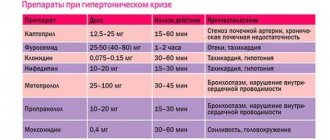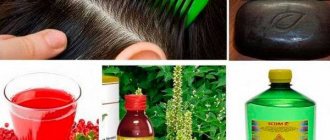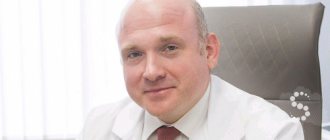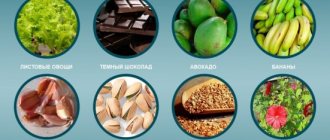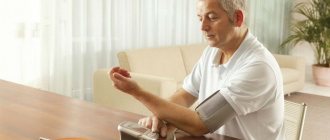Medicines that increase blood pressure are of interest to either hypotensive patients who need to get rid of a symptom, or hypertensive patients who want to prevent an even greater increase in pressure. Hypotension (decreased blood pressure) threatens drowsiness, fatigue (even if a person has slept and rested normally), decreased mental abilities and physical activity. A person becomes drowsy and may sleep longer at night than people with normal blood pressure.
- Non-drug treatments for hypotension
- Medicines for high blood pressure
- Citramon to increase blood pressure
- What does Askofen help with?
- Does Coficil Plus increase blood pressure?
- Does pu-erh increase blood pressure?
- Pressure and Cordiamine
- Does creatine increase blood pressure?
- Does Ketorol increase blood pressure?
- Propolis - for blood pressure?
- Antibiotics and blood pressure
- Ascorbic acid and blood pressure
- Pentalgin - does it lower blood pressure?
- Does Echinacea Increase Blood Pressure?
- Ibuprofen increases blood pressure
- Actovegin for blood pressure
- Pentalgin and blood pressure
Non-drug treatments for hypotension
It is possible to increase blood pressure without medications to some extent, and this measure is purely individual. It is important to walk in the fresh air more often, at least an hour a day, and for pregnant women - at least an hour in the morning/afternoon and an hour in the evening. Sports or physical activity stimulates blood circulation, and accordingly, blood pressure normalizes. Although it is known that professional athletes have slightly lower blood pressure levels than other people.
If you notice problems with blood pressure, it will be useful to take a contrast shower in the morning (alternate cold and hot water). This procedure has its own characteristics, which we will not describe here. To normalize blood pressure, proper nutrition is important. During fasting, the body begins to save resources, temperature and pressure decrease. Sleep should be at least 8 hours a day for teenagers and adults. You should also avoid overwork, both mental and physical equally. Alternate mental and physical activities.
Sources
- A.V. Barsukov, A.M. Karimova, Yu.Sh. Khalimov, D.V. Glukhovskaya The problem of arterial hypotension in young patients in clinical practice // Bulletin of the Russian Military Medical Academy. – 2021. – No. 3 (55)
- ROBERT STIGLER. Normaler und hoher Blutdruck und kardiavaskuläre Mortalität bei verschiedenen Völkern [Electronic resource] // Springer-Verlag Berlin Heidelberg GmbH, 1964.
- Michel Burnier, Edward Pivin, Fatma Megdiche. Neue Ziele für die Behandlung von Bluthochdruck? [Electronic resource] // Swiss Medical Forum ‒ Schweizerisches Medizin-Forum, March 2021.
- PROF. LUCA RIDOLFI, DOTT.ING. ANDREA GUALA. Fluidodinamica del sistema arterioso durante l'infanzia e l'adolescenza [Electronic resource] // Emodinamica del sistema arterioso, 2021.
- Keith Sturgess. Management and treatment of hypotension and hypertension [Electronic resource] // Vet Times, 2021.
Medicines for high blood pressure
If non-drug methods of increase do not produce results, you need to resort to the use of medications. A common remedy is caffeine sodium benzoate (tablets). This stimulant is known throughout the world and is added to energy drinks. However, they increase blood pressure, but negatively affect the functioning of the gastrointestinal tract. Therefore, drinking energy drinks is not recommended!
Caffeine is also known as trimethylxanthine. This is a powder that has a bitter taste. This substance is also a diuretic; it dilates peripheral blood vessels. It increases blood pressure only for a while. With normal blood pressure, the readings may not change when taking caffeine. You should follow the dosage prescribed by your doctor (or indicated in the instructions for the drug). In large doses, the drug can negatively affect some organs; it is also rare, but it causes addiction.
The second popular remedy is lemongrass tincture. 25 drops are diluted in 100 ml of water. Give to the patient 15 minutes before meals, 2-3 times a day. It is not recommended to take this alcohol infusion at night. If you have insomnia, try using it only in the morning and at lunchtime, and after 16:00 do not drink lemongrass tincture to increase blood pressure.
Ginseng tincture is the third most popular remedy for increasing blood pressure in hypotensive patients. The drug is also believed to strengthen the immune system. Do not use this medicine in the evening as it will make it difficult to fall asleep. This remedy is also not suitable for pregnant and breastfeeding women. One dose delivers an average of 20 drops.
Eleutherococcus is also a popular remedy for raising blood pressure. It relieves accumulated fatigue and is used in frequent stressful situations. After long illnesses, the body is weakened, so the doctor may also prescribe a tincture of Eleutherococcus. But this is not only a tincture; the drug is available in capsules and tablets. There is also dry raw material that is brewed and drunk. The most popular is the liquid extract of Eleutherococcus. Take 1-3 times a day, 15-30 drops (depending on the age and weight of the patient). The course of treatment for hypotension is 30 days.
Leuzea extract normalizes blood pressure, tones the body and strengthens the body's defenses. Thanks to this remedy, the body adapts to heavy loads. Take 1-3 times a day, twenty or thirty drops. This drug is also available in tablet form, take a maximum of 3 times a day, 1-2 tablets.
All the drugs mentioned above stimulate, to a greater or lesser extent, the activity of the heart, blood vessels and nervous system. Thus, after taking one of these drugs, a person’s vascular tone increases, which is why blood pressure increases. Below we will describe how other drugs that people periodically use to treat hypotension affect blood pressure readings.
Medicines that increase blood pressure
Home Medical encyclopedia Medicines Cardiovascular medicines
Medicines used to correct a sharp drop in blood pressureSee also adrenaline.
ANGIOTENSINAMIDE (Angiotensinamidum)
lL-Asparagyl-5-b-valylangiotensin
Synonyms: Hypertensin.
Pharmachologic effect. It has a pressor (increasing blood pressure) effect due to an increase in peripheral vascular resistance, especially small-caliber arterioles, is capable of contracting the smooth muscles of the uterus, intestines, urinary and gall bladder, increases the secretion of aldosterone and increases the release of catecholamines.
Indications for use. Shock state, especially with isovolumic shock (without massive blood loss) associated with vasomotor collapse (a sharp drop in blood pressure due to vasodilation) - post-traumatic and postoperative shock, shock during intoxication, coma and infectious diseases, as well as with myocardial infarction, cardiac tamponade ( compression of the heart by blood or fluid accumulated in the pericardial sac), massive pulmonary embolism (blockage of the pulmonary artery), etc.
Method of administration and dose. Administered intravenously at an initial rate of 5-20 mcg/min. In severe cases, the initial rate may be 50-60 mcg/min. When the systolic (“upper”) blood pressure reaches 90-110 mmHg. Art. the infusion rate is reduced to 1-3 mcg/min depending on the patient’s condition. The drug can be administered long-term (over many hours or several days).
Side effect. Bradycardia (rare pulse), which is stopped (removed) by atropine.
Contraindications. Hypovolemic shock (shock occurring against the background of a sharp drop in circulating blood volume). Caution should be exercised in patients with cardiac arrhythmias.
Release form. Angiotensinamide lyophilized form (dosage form dehydrated by freezing in a vacuum) 0.001 g (1 mg) for injection.
Storage conditions. List B. In a place protected from light.
HEPTAMIL (Geptamil)
Pharmachologic effect. It is a highly effective and non-toxic remedy that increases the tone of the cardiovascular system. It has a pronounced cardiotonic (increasing the force of heart contractions) effect, increases cardiac output, coronary (heart) blood flow, tones the peripheral circulatory system, returns deposits
fused blood into the arterial system without causing significant vasoconstriction.
Indications for use. Shock, collapse (sharp drop in blood pressure), myocardial infarction, heart failure of any degree (acute and congestive), hypotension (low blood pressure), asthenia (weakness), fainting, cor pulmonale, cardiovascular failure in the elderly, “neuroleptic syndrome” caused by taking antipsychotics (a condition caused by inhibition of the functions of the central nervous system under the influence of antipsychotics).
Method of administration and dose. In case of shock, collapse and other cases of a sharp drop in blood pressure, 2 ampoules of heptamyl are prescribed intravenously. If necessary, intravenous infusion is repeated using the stream and drip method. 1-2 ampoules are administered intramuscularly, and if necessary, increase to 5 ampoules. In cases of neonatal resuscitation, the drug is administered in an amount of 2 ml directly into the umbilical cord.
Orally for hypotension and asthenia, adults are prescribed 2 tablets (or 30 drops) 3 times a day; children - from 10 to 40 drops per day, depending on age.
Contraindications. Hypovolemic shock (shock occurring against the background of a sharp drop in circulating blood volume). Caution should be exercised in patients with cardiac arrhythmias.
Release form. Ampoules of 313 mg in 5 ml of solution; tablets 50 mg; bottles with 40 ml of solution (drops).
Storage conditions. List B. In a dry place, protected from light.
DOPAMINE (Dophaminum)
Synonyms: Dopamine, Dopmin, Aprical, Cardiosteril, Dopamex, Dophan, Dinatra, Hydroxytyramine, Intropin, Revivan.
Pharmachologic effect. It has a specific effect on dopaminergic receptors. Under the influence of dopamine, peripheral vascular tone increases and blood pressure increases. However, this decreases renal vascular resistance and increases renal blood flow, which leads to an increase in renal filtration
Indications for use. Shock conditions caused by various reasons: cardiogenic, traumatic, endotoxic, postoperative, hypovolemic shock, etc. Due to a lesser effect on peripheral vascular resistance, an increase in renal blood flow and blood flow in other internal
organs and other features, dopamine is considered more indicated in these cases than norepinephrine and other catecholamines.
Dopamine is also used to improve hemodynamics in acute cardiac and vascular failure that develops in various pathological conditions.
Method of administration and dose. Administered intravenously; 25 or 200 mg of the drug are diluted, respectively, in 125 or 400 ml of 5% glucose solution or isotonic sodium chloride solution (the dopamine content in 1 ml is 200 or 500 mcg, respectively).
The initial rate of administration is 1-5 mcg/kg per minute (2-11 drops of a 0.05% solution). If necessary, the rate of administration is increased to 10-25 mcg/kg per minute (average 18 mcg/kg per minute).
The infusion is carried out continuously for 2-3 hours to 1-4 days. The daily dose reaches 400-800 mg.
The effect of the drug occurs quickly and ceases 5-10 minutes after the end of administration.
The optimal dose must be selected in each individual case under constant monitoring of hemodynamics and electrocardiogram.
Side effect. Large doses cause spasm (sharp narrowing of the lumen) of peripheral vessels, tachycardia (increased heart rate), ventricular extrasystole, the appearance of junctional rhythm (heart rhythm disturbances), angina pain, respiratory failure, headache, psychomotor agitation and other signs of adrenomimetic action.
Contraindications. Pheochromocytoma (adrenal tumor). It should not be prescribed for arrhythmia in combination with monoamine oxidase inhibitors, cyclopropane and halogenated anesthetics (fluorothane, trichlorethylene).
Release form. 0.5% or 4% solution in ampoules of 5 ml (25 or 200 mg of dopamine).
Storage conditions. List B: In a place protected from light.
CORDIAMIN (Cordiaminum)
Synonyms: Niketamide.
Pharmachologic effect. A stimulant of the central nervous system, stimulates the respiratory and vasomotor centers.
Indications for use. Acute and chronic circulatory disorders, collapse (sharp drop in blood pressure) and asphyxia (breathing failure) in shock, asphyxia (lack of breathing) in newborns, poisoning with sleeping pills, narcotic analgesics.
Method of administration and dose. Intravenously (slowly) 0.5-2.0 ml 2-3 times a day. For children, 0.1-0.75 ml subcutaneously, depending on age. For poisoning with sleeping pills, drugs, agalgesics (painkillers), intravenously (slowly) up to 3-5 ml.
Higher doses: parenterally (bypassing the digestive tract) single - 2 ml, daily - 6 ml.
Side effects and contraindications
Release form. In bottles of 15 ml; ampoules of 1 ml and 2 ml, in a package of 10 pieces.
Storage conditions. List B. In a place protected from light.
MEZATON (Mesatonum)
Synonyms: Phenylephrine hydrochloride, Adrianol, Almefrin, Derisen, Idrianol, Isofrin, Neofrin, Neo-Synephrine, M-Sympatol, Vizadrone, etc.
Pharmachologic effect. Adrenomimetic agent. Stimulates alpha-adrenergic receptors, has a weak effect on beta-receptors of the heart.
Indications for use. Hypotension (low blood pressure).
Method of administration and dose. In case of collapse (sharp drop in blood pressure), 0.3-1 ml of a 1% solution in 40 ml of a 40% glucose solution is administered intravenously slowly under blood pressure control. If long-term use is necessary, 1.0 ml of a 1% solution in 250-500 ml of a 5% glucose solution is administered intravenously.
Side effect. Headache, nausea (with increased blood pressure).
Contraindications. Severe atherosclerosis. Particular caution is required in case of hyperthyroidism (disease of the thyroid gland), a tendency to vasospasm (sharp narrowing of the lumen of blood vessels), as well as in the elderly.
Release form. Powder, ampoules of 1 ml of 1% solution, 10 pieces in a package.
Storage conditions. List B. In a place protected from light; powder in well-sealed orange glass jars.
NORADRENALINE HYDROTARTTRAT (Noradrenalinihydrotartras)
Synonyms: Levarterenol bitartrate, Arterenol, Levarterenol, Levofed, Norarthrinal, Norepinephrine, Norexadrin, etc.
Pharmachologic effect. Stimulates predominantly alpha-adrenergic receptors. Compared to adrenaline, it has a stronger vasopressor (constricting blood vessels) effect and stimulates heart contractions to a lesser extent; has a weak bronchodilator (dilates the lumen of the bronchi) effect.
Indications for use. An acute drop in blood pressure due to injuries, surgical interventions, poisoning, moderate cardiogenic shock, sometimes with internal bleeding, etc.
Method of administration and dose. Intravenously (drip) 2-4 mg of the drug (1-2 ml of 0.2% solution) in 500 ml of 5% glucose solution (under blood pressure control).
Side effect. With rapid administration, nausea, headache, chills, palpitations; when it gets under the skin, necrosis (tissue death) occurs, so constant monitoring of the position of the needle in the vein is necessary. If norepinephrine gets under the skin, 5-10 mg of phentolamine is administered in 10 ml of saline.
Contraindications. With chloroform, fluorotane, cyclopropane anesthesia. Caution is necessary in case of severe atherosclerosis, circulatory failure, complete atrioventricular block (impaired conduction of excitation through the heart).
Release form. 1 ml of 0.2% solution in ampoules in a package of 6 pieces.
Storage conditions. List B. In a place protected from light.
FETANOL (Phetanolum)
Synonyms: Etilephrine, Ethyladrianol, Circulan, Effontil, Effortil, Etifillin, Curtazin, Pressoton, etc.
Pharmachologic effect. In terms of its chemical structure and effect on the body, it is close to mesatone; it increases blood pressure to a lesser extent, but for a longer period.
Indications for use. Hypotension (low blood pressure) of various origins, shock, collapse (sharp drop in blood pressure).
Method of administration and dose. Orally 5 mg 2-3 times a day if necessary for several weeks. Parenteral: 1 ml of 1% solution under the skin, intramuscularly or slowly into a vein. It can be administered dropwise into a vein in a 5% glucose solution or in an isotonic sodium chloride solution (at the rate of 1 ml of a 1% fethanol solution per 100 ml of solution; a total of up to 300 ml is administered, i.e. 30 mg of the drug); injection rate is 60-80 drops per minute.
Young children are prescribed orally 0.00125-0.0025 g 0/4-'/2 tablets) 2-3 times a day; 0.1-0.4 ml of a 1% solution is injected under the skin.
For older children, give orally 0.0025-0.005 g 0/2-1 tablet) 2-3 times a day; 0.4-0.7 ml of a 1% solution is injected under the skin.
Side effect. With rapid intravenous administration, headache.
Contraindications. Severe atherosclerosis, hypertension (persistent rise in blood pressure). Particular caution is required if you are prone to vasospasms (spasms - a sharp narrowing of the lumen of blood vessels).
Release form. Powder; tablets of 0.005 g in a package of 20 pieces; in ampoules of 1 ml of 1% solution in a package of 10 pieces.
Storage conditions. List B. In a place protected from light.
EPHEDRINE HYDROCHLORIDE (Ephedrinihydrochloridum)
Synonyms: Ephedrine hydrochloride, Efalon, Ephedrozan, Neo-Phedrin, Sanedrin, Efetonin, etc.
Pharmachologic effect. Alpha and beta adrenergic receptor stimulator. Compared to adrenaline, it has a weaker effect, but lasts longer.
Indications for use. Arterial hypotension (low blood pressure), poisoning with sleeping pills and drugs.
Method of administration and dose. Into a vein slowly (0.5-1 ml of 5% solution) and drip (2 ml of 5% solution in 500 ml of 5% glucose solution or isotonic sodium chloride solution). 0.02-0.05 g is injected under the skin and into the muscle 2-3 times a day.
Side effect. Palpitations, nausea, trembling of limbs, increased sweating, insomnia, nervous agitation, urinary retention.
Contraindications. Insomnia, severe arterial hypertension (persistent rise in blood pressure), severe atherosclerosis, hyperthyroidism (thyroid disease). Special caution is required in case of organic heart diseases.
Release form. Powder; tablets of 0.025 g in a package of 10 pieces; ampoules of 1 ml of 5% solution in a package of 10 pieces.
Storage conditions. List B. In a place protected from light; powder - in a well-closed container.
| print version | This information is not a guide to self-treatment. A doctor's consultation is required. |
Citramon to increase blood pressure
Citramon contains acetylsalicylic acid, paracetamol and caffeine. The first component thins the blood, the second reduces pain, and caffeine, as already noted, stimulates breathing, nerves and heart activity. It has a positive effect on blood circulation, so the body receives more oxygen. When the pressure normalizes, the person begins to work more actively. It is believed that citramon increases blood pressure. But the content of the invigorating component in this medicine is very small, so you will need 2 tablets, and even then they do not help in all cases.
High pressure target
Whatever the reason for the rise in pressure, the result is the same - the wall of the blood vessels is overloaded, and the formed elements of the blood and large molecules, for example, glucose, like plates with sharp edges, scratch the vascular wall from the inside more and more. And the more microcracks there are, the faster cholesterol will be deposited in them, and the faster an atherosclerotic plaque will begin to form in this place. Well, some organs, which are usually called target organs of hypertension, suffer directly from high blood pressure - the heart is pumped up like a bodybuilder’s biceps, but this only affects its nerves and arteries, the kidneys become overgrown with connective tissue (nephrosclerosis develops), the optic nerve swells and vision deteriorates, the brain suffers. But... even for such serious complications, the count is not in hours or days. This is the result of prolonged, months of high blood pressure.
What does Askofen help with?
The composition of this medicine is similar to Citramon, only different proportions are used. The drug helps relieve pain, inflammation, and it also normalizes the temperature if it is elevated. Due to the fact that it contains caffeine, the effect of which is described above, the excitability of the central nervous system increases, fatigue goes away to some extent, and the person becomes more active. Askofen increases blood pressure if it is low. It should be taken for hypotension in the amount of 2 tablets, but it does not help everyone, and its effect is short-lived (relates to increasing blood pressure). Continuous use of the drug is not recommended.
Hypertension
Few people in our time have not heard anything about hypertension, or high blood pressure. This is not surprising - after all, in the modern world, every third adult is faced with this problem and is forced to look for ways to solve it.
Blood pressure is considered elevated if its value is 140/90 mmHg. Art. or higher, regardless of the person's age. Most often, high blood pressure is an independent disease called hypertension. But sometimes hypertension is a symptom of some other disease (for example, kidney disease, thyroid disease, adrenal gland disease). In this case, in addition to reducing the numbers, the underlying disease must be treated.
Does Coficil Plus increase blood pressure?
This drug is sometimes prescribed instead of askofen and citramon. It also contains paracetamol, aspirin and caffeine. Coficil Plus relieves pain and inflammation, and also has psychostimulating activity. This medicine increases blood pressure, again due to the presence of caffeine in its composition.
Coficil Plus should be taken after meals in the amount of 1-2 tablets. You can take no more than six tablets per day. The course lasts up to 5 days. With longer use, a negative effect on the organs and systems of the body is likely. If you take too many pills, you may experience heart palpitations, short-term hypertension, and tinnitus. To get rid of this condition, sorbents are used. Coficil Plus should not be taken to lower blood pressure!
How to increase blood pressure without drugs
At home, you can raise your blood pressure with the help of special exercises, breathing practices, foods, drinks and even plain water.
Correct body position, exercises, massage
If hypotension occurs, it is recommended to lie down immediately. If there are no conditions for this, you can improve your well-being in the following ways:
- immediately sit down and lower your head as low as possible, placing it between your knees - to ensure a sufficient flow of blood to the brain;
- sit down with your legs crossed - by reducing the amount of blood in the lower extremities, its volume and pressure in the main vessels will increase;
- standing, cross your legs at the knees and press your thighs together;
- raise your leg, place it on a bench or chair, while tilting your body forward as much as possible.
Interesting: if you have low blood pressure, you can wear elastic stockings for varicose veins. They will displace some of the blood from the lower extremities into the main vessels of the body, thereby increasing the pressure.
The following physical exercise will help improve your condition (if your age allows): you need to lie down, put your legs behind your head and stay in this position for 5-10 minutes. It is also useful to massage the neck and shoulders, actively rub the muscles of the legs and lower back.
Food and drinks
The pressure in the circulatory system depends on various factors. To raise blood pressure in an adult , you need to increase the tone of the vascular walls, increase the volume of fluid in the body, speed up the heartbeat, and increase the level of glucose in the blood. The following foods and drinks will help you urgently achieve these goals:
- ordinary clean, mineral or slightly salted water - you need to drink 1-2 glasses;
- natural coffee with a slice of dark chocolate;
- strong, freshly brewed black or green tea;
- cocoa with sugar;
- a glass of hot hibiscus tea;
- pomegranate juice;
- a piece of salted fish, cheese or lard, a pickled cucumber, a piece of generously salted rye bread or simply dissolving salt under the tongue - a common kitchen seasoning containing sodium retains fluid in the body and increases blood volume;
- slice of bread with honey and cinnamon.
Important! Caffeine quickly tones blood vessels and causes the heart muscle to contract more often. But it increases blood pressure if a person rarely drinks coffee. But for coffee lovers, the invigorating drink has the opposite effect, dilating blood vessels. In this case, it is better to make a decoction of rose hips, strawberry leaves or black currants.
Breathing exercises
Hatha Yoga has a section called pranayama, which describes the control of vital energy using specific types of breathing. One of two simple exercises from the practice of pranayama will help increase blood flow and increase pressure in the vessels:
- "Bhastrika". Forced inhalations and exhalations are performed through the nose. After 10 repetitions, tinnitus usually appears, darkening of the eyes and slight dizziness are possible. These are signs of activation of the nervous system and increased oxygen supply. It is advisable to perform 3 sets of 20 inhalations and exhalations.
- "Kapalabhati". Alternate between normal inhalation and intense exhalation through the nose, strengthened by the abdominal muscles (they seem to “squeeze out” the remaining air). Kapalbhati is also performed in 3 steps of 20 repetitions.
As a result of any of the exercises, the tonometer readings will increase after 5 minutes. If you practice the complex daily to train the nervous system, then after a couple of months the base pressure will be adjusted upward.
what to do if you have low blood pressure
Does pu-erh increase blood pressure?
Pu-erh is a dark variety of tea, but not black, as the manufacturing technology is different. Budget options for this tea are ready-made Pu-erh (Shu) and raw Pu-erh (Shen). At reduced pressure, the second of them is used. Thanks to it, the body’s tissues receive more nutrition, and digestion is normalized to some extent.
Shu Pu'er should not be drunk in large quantities. It lowers cholesterol in the blood, is used to prevent vascular and heart diseases, and removes harmful substances and toxins from the body. Pu-erh increases blood pressure, so if the norm is exceeded, short-term hypertension may occur. To avoid affecting blood pressure, drink it not so strong or in the amount of 1-2 cups per day. It is better to avoid consumption at night.
How to improve blood pressure permanently
Regular physical activity is needed to maintain normal blood pressure.
Photo: tertyshnyk_oksana / freepik.com To consolidate success, you can make changes to your lifestyle and increase your blood pressure for a long time. For example, you can:
- Switch to a diet with a high salt content - but only a little, it is important not to go beyond the adequate recommendations;
- Reduce consumption of alcoholic beverages;
- In hot weather, drink more fluids;
- Ask the doctor to evaluate the medications the person is prescribed to take. Perhaps some of them have hypotension as a side effect;
- Play sports - at least 150 minutes of physical activity per week;
- Reduce the time you spend standing still.
If necessary, your doctor may recommend elastic compression stockings that cover the calf and thigh. They will help limit blood flow to your legs—and keep more blood in your upper body.
Pressure and Cordiamine
The drug is an analeptic; it stimulates the CENS and chemoreceptors. This medicine increases your blood pressure. Breathing, accordingly, becomes more frequent and deeper, consciousness becomes clearer. Cordiamine can be used in case of a sharp decrease in blood pressure, for example, with suffocation or fainting.
Cordiamine is available in drops that need to be taken orally. Also available as a solution that is administered by injection. You need to take drops 1-3 times a day, 20-40 drops. And by injection (into the muscles, into the veins) it is administered in an amount of 1 to 2 ml. Among the side effects caused by overdose, researchers name overexcitement and seizures. You cannot prescribe this drug to yourself!
Does creatine increase blood pressure?
Creatine is an amino acid that athletes take as a supplement. Creatine increases endurance and is used for more active muscle building. The feeling of fatigue when taking creatine becomes less, so workouts can be more intense, etc.
Creatine retains some fluid in the body, which is why it presumably increases blood pressure. But this only occurs in a small percentage of people. For others, urine output and blood pressure remain unchanged. To prevent blood pressure from increasing with constant use of creatine, it is better not to drink strong tea (including pu-erh) and coffee during this period.
Central nervous system stimulants
The drugs included in this group of drugs improve the functioning of the central nervous system, help increase blood pressure, and also stimulate mental activity. With the use of stimulants, a person’s reaction speed and ability to work increase.
If you have low blood pressure, you can take the following drugs from the stimulant category:
- Akrinor;
- Symptol;
- Bellataminal.
Akrinor
Low blood pressure tablets Akrinor cause a prolonged rise in blood pressure. In this case, the peripheral vascular resistance remains almost unchanged. The necessary therapeutic effect is due to an increase in stroke and cardiac output.
The heart rate remains unchanged. Additionally, coronary circulation improves. Indications for use: hypotension (secondary/primary), circulatory failure, etc.
Symptol
Symptol is a peripheral circulatory analeptic with a mild effect. Against the background of its use, a narrowing of peripheral vessels occurs, which causes an increase in blood pressure. An additional effect is an increase in the number of myocardial contractions and an increase in the total circulating blood.
Important! Symptol brings low blood pressure back to normal, but does not cause a pathological increase.
Indications for use:
- hypotension;
- low blood pressure in older people.
Bellataminal
Bellataminal is a combination drug belonging to the group of anticholyenergetic drugs. It is prescribed if the development of hypotension is caused by dysfunction of the vagus nerve. The drug contains belladonna alkaloids, ergotamine and phenobarbital.
The first two components provide a slight antispasmodic effect. Phenobarbital relieves the excitability of peripheral nerve endings. To achieve the desired therapeutic effect, long-term use is required - at least a full calendar month.
Does Ketorol increase blood pressure?
Ketorol relieves inflammation and pain. Refers to non-steroidal drugs. The active ingredient of this medicine is ketorolac. Ketorol is available in tablets and liquid for injection. When taking the medicine, a slight increase in blood pressure may occur. But this only happens if a person is prone to hypertension. Ketorol cannot be combined with drugs that lower blood pressure, as well as with diuretics, because taking Ketorol will reduce their effectiveness.
When to call an ambulance
As soon as you notice not only a significant drop in blood pressure in yourself or a loved one, but also
- cold, clammy and pale skin;
- fast shallow breathing;
- weak and fast pulse;
- confusion.
These are signs of so-called acute arterial hypotension (collapse, shock). This condition is life-threatening. It can lead to hypoxia of the brain and internal organs. Therefore, you should not hesitate to seek medical help.
Propolis - for blood pressure?
Propolis is produced by bees from resinous substances collected from plants. This is a useful substance that has antiviral, antibacterial, anti-inflammatory effects, etc. Propolis helps relieve fatigue and increase activity.
Researchers from Bulgaria wondered about the effect of propolis on human blood pressure. The experiment involved people with hypertension who were diagnosed with this disease 4-5 years ago. They were placed in a hospital, where they must remain without taking medications that affect blood pressure. Next, propolis (30% alcohol solution) was prescribed for treatment. It was given to patients 40 drops 3 times a day, an hour before meals. After the experiment, the patients experienced symptoms such as headaches, no more noise in their ears, no more heart problems, etc. In ¾ of the patients, the blood pressure returned to normal. But in one quarter of the subjects, blood pressure remained at approximately the same level as before the start of the tests. From this they conclude that propolis reduces blood pressure.
How to increase blood pressure quickly and effectively
Source: Raeann Buskey/Pixy.org
Only a doctor can prescribe medications for high blood pressure. But it is possible to help a person in an acute situation and alleviate his condition during a sudden attack of hypotension without medications.
Coffee
Drinking a cup of strong, freshly ground coffee is the best solution. Caffeine has a pronounced vasoconstrictor effect, so it reduces blood pressure well and has a tonic effect.
Massage
Impact on some biologically active points irritates the nerve endings and activates the blood circulation process. Massage has a beneficial effect on all body systems, accelerating metabolism and toning blood vessels.
Important! Massage is a procedure for actively influencing the body and should be trusted to professionals with medical education. Incorrect massage technique can cause significant harm to health.
Massage can improve mood, relieve spasms, relieve headaches and joint pain, and normalize sleep.
Increasing blood pressure with nutrition
If low blood pressure is not associated with internal diseases, then it can be easily normalized by including some foods in the diet:
- green tea - it tones well and improves blood circulation;
- kefir, fermented baked milk, yogurt, cottage cheese and other fermented milk products;
- celery root, which can be added to salads or other dishes;
- strawberries, fresh vegetables and fruits - carrots, tomatoes, pumpkin, apples;
- beet juice.
The diet for hypotension is aimed at increasing the overall tone of the body, replenishing the deficiency of vitamins and minerals, accelerating metabolic processes and normalizing the water-salt balance.
Pharmacy tinctures
Herbal tinctures are widely used to increase blood pressure and generally strengthen the body. To be safe and avoid the risk of incorrect dosage, it is better to buy tinctures at a pharmacy and strictly follow the directions on the package. And in the future, it is better to consult a doctor and choose the formulations that he recommends.
Ginseng tincture
Ginseng root has been used medicinally for over two thousand years. One of the main properties of this plant is its ability to regulate blood pressure. Depending on the dosage, ginseng root tincture is used to both increase and decrease blood pressure.
A decrease in blood pressure when taking the tincture occurs due to:
- increasing the overall tone of the body;
- strengthening the walls of blood vessels;
- improved appetite;
- normalization of emotional state;
- acceleration of metabolic processes.
Before taking ginseng tincture, you should consult your doctor and make sure there are no contraindications.
Eleutherococcus tincture
It is a proven remedy for nervous disorders, problems with the immune system and low blood pressure.
It is believed that the product improves performance and speeds up metabolism. It is prescribed for general exhaustion of the body, physical overload, anemia, and atherosclerosis. The biologically active substances contained in the tincture increase vascular tone and normalize blood pressure.
The dosage and duration of treatment is determined by the doctor based on the severity of symptoms and the absence of contraindications.
Schisandra tincture
Chinese lemongrass is a type of climbing vine. Its fruits, which contain essential oils, organic acids and microelements beneficial to the body, are used in medicine.
Schisandra tincture increases vascular tone and has a general tonic effect. The product can be used to quickly raise blood pressure and normalize well-being.
Important! All herbal products can only be used as adjuvant therapies. They should be taken only after consultation with your doctor at the recommended dosage.
Antibiotics and blood pressure
Antibiotics today treat most infectious diseases. Antibacterial drugs do not affect the activity of the heart and the condition of blood vessels if taken as prescribed by the doctor. If you drink alcohol during a course of antibiotics, the toxic effect of the drugs on the body is likely to increase. Death as a result of such negligence with one’s own body is also possible. The combination of alcohol and drugs can greatly increase blood pressure, make it difficult to breathe, and slow down your heart function. The load on the liver also increases, which affects blood pressure levels.
Ascorbic acid and blood pressure
Ascorbic acid (vitamin C) affects blood clotting and capillary permeability. This drug may increase blood pressure in some people. If you self-medicate, exceed the frequency of use or dosage of the medicine, it is likely that your blood pressure will increase and kidney function will be impaired. An increase in blood pressure when taking ascorbic acid is considered a side effect. Vitamin C is not prescribed to influence blood pressure.
Safe and effective medications for low blood pressure (hypotension).
May 2, 2021
23618
4.5
1
Content
- How to choose medications for low blood pressure?
- Caffeine
- Ekdisten
- Gutron
- Caffeamine
- Apilak
With hypotension, a person feels dizziness, malaise and deterioration in general well-being. Low blood pressure is a condition when blood pressure numbers fall below normal values.
We speak of low blood pressure when its value is about 90/60. Some people feel great with this pressure (no treatment is required), while others experience unpleasant symptoms. If you feel unwell with hypotension, be sure to consult a doctor to determine the cause of this condition and get the right treatment.
Pentalgin - does it lower blood pressure?
This is a drug for pain, which contains naproxen, paracetamol, drotaverine, caffeine, pheniramine. If the pressure is normal or below normal, the values on the tonometer will not change when taking Pentalgin. Since the drug contains caffeine, the blood vessels may narrow, which means that the pressure will not increase by much. In severe hypertension, the drug is contraindicated.
Pentalgin increases blood pressure if taken in excess of the norm or for long courses. You can take no more than 4 tablets per day, and the duration of the course is a maximum of 5 days.
Does Echinacea Increase Blood Pressure?
Echinacea is a natural herbal remedy. It is used mainly to relieve inflammation and strengthen the body's defenses. Also, medicines based on echinacea improve metabolic processes. If you use these medications for a long time or in large quantities, side effects may occur:
- excitability of the central nervous system
- irritability
- dizziness
- difficulty falling asleep
- increased blood pressure
Echinacea should not be prescribed to patients with collagenosis, blood diseases, autoimmune diseases, or to pregnant women. You can find out other contraindications from the instructions for a particular drug.
Causes of low blood pressure
Blood pressure decreases with a lack of body weight, anemia (lack of hemoglobin in the blood), unfavorable working conditions, moving to another climate zone or high mountain region, or a change in weather or season. A sharp drop in blood pressure combined with malaise can be caused by:
- acute heart failure;
- concussion, head injury;
- exacerbation of a peptic ulcer or an attack of pancreatitis
- intoxication;
- overdose of cardiac drugs (Corvalol, motherwort tincture, valocardine);
- taking antispasmodics and anesthetics, large doses of antibiotics.
Pressure drops with any blood loss - due to injury, severe nosebleeds or hemorrhoids. In completely healthy people, blood pressure values sharply decrease after procedures that dilate blood vessels - hot baths, steam baths, saunas, wraps, swimming in thermal springs. In childhood and adolescence, low blood pressure is associated with disorders of the autonomic nervous system due to accelerated growth.
Persistent hypotension can be caused by various diseases:
- chronic heart failure - when the heart becomes inflamed as a result of endo- or myocarditis (occurs after tonsillitis, flu), it pumps blood worse;
- cardiac arrhythmias and blockades caused by disruptions in the nervous regulation of the heart;
- pre-infarction condition;
- chronic adrenal insufficiency;
- diabetes;
- hypothyroidism;
- renal failure;
- neurocirculatory vascular dystonia;
- different types of depression
For chronic hypotension, accompanied by dizziness, weakness, nausea, you should consult a therapist. If you are concerned about frequent symptoms of low blood pressure, an in-depth examination is recommended: ultrasound of the heart and blood vessels, cardiography, FGDS. You can get a referral to a neurologist, cardiologist, endocrinologist, or gastroenterologist from your therapist.
Ibuprofen increases blood pressure
Ibuprofen is classified as an anti-inflammatory non-steroidal drug. It normalizes body temperature and relieves pain; in this regard, it is better to use this particular medicine than aspirin. Ibuprofen can increase blood pressure, since this is a side effect that occurs in some cases when taking the drug in question. It should be prescribed with caution to patients with impaired liver function. Because Ibuprofen increases the toxic load on this organ, which may cause portal hypertension. The drug is not used to treat hypotension!
Actovegin for blood pressure
Actovegin improves tissue nutrition and affects reparative processes. It is prescribed for encephalopathy, ischemic stroke, neurological diseases, etc. Actovegin does not increase blood pressure, and in some cases it can reduce it. The drug can be prescribed for cerebral vascular hypertension, because its active ingredients moderately dilate blood vessels. In severe hypertension, Actovegin is part of systemic therapy and is administered intravenously.
Ekdisten
This is a herbal medicine that comes in the form of tablets and powder sachets. The active substance of the drug is a plant extract from the rhizomes of Leuzea safflower. "Ecdisten" improves overall metabolism, vascular tone, stimulates protein synthesis, and has a weak anabolic effect.
This drug is prescribed for low blood pressure, general asthenia, to improve performance and for weather dependence.
Contraindications include: age under 18 years, allergies to drug components, hypertension, nervous disorders with agitation, epilepsy, stomach ulcers. Ecdisten should be prescribed with caution to those with diabetes or thyroid disease. Alcohol is contraindicated while taking Ecdisten.
Ekdisten
Wifitech/Vilar, Russia
The drug Ecdisten is used in adults as a tonic: asthenodepressive syndrome (associated with a weakening of protein synthesizing processes: during prolonged intoxication, infections), neurasthenia. And also as part of combination therapy - arterial hypotension, intense training (dysfunction of the cardiovascular system, especially with pronounced signs of myocardial overstrain and increased protein catabolism), as a drug that increases speed and strength qualities during the period of preparation for competitions.
298
- Like
- Write a review
Pentalgin and blood pressure
Pentalgin is taken to relieve pain, inflammation, and the drug also has an antispasmodic and fever-reducing effect. It contains paracetamol, naproxen, caffeine, drotaverine, pheniramine, etc. It is recommended to use 1 tablet per day. One tablet contains 50 mg of caffeine, which may increase blood pressure. But drotaverine dilates blood vessels, so the pressure generally remains normal. Pentalgin may increase your blood pressure if it is below normal when you take the drug. But pressure indicators change only after taking 2 tablets at a time. The medicine is not used to treat hypotension.
Don't wonder which medications increase blood pressure. Consult a doctor who will help eliminate the cause of this symptom, and you will not have to spend money on medications and poison your body with unknown drugs. Before taking medications that increase blood pressure, you need to double check your blood pressure monitor.


